Theory of Knowledge Essay: Exploring the Role of Truth in Explanations
VerifiedAdded on 2023/05/29
|9
|2437
|187
Essay
AI Summary
This essay, focusing on the Theory of Knowledge, addresses the question: "Do good explanations always need to be true?" The student argues that while evidence is important, a good explanation doesn't necessarily have to be factually true to be beneficial. The essay presents arguments and counterarguments, exploring whether the quality of an explanation is determined by its benefits to individuals or by the truth of its underlying hypotheses. It discusses the psychological aversion to harsh realities, the importance of making knowledge accessible, and the impact of factors like language and emotions on understanding. The essay concludes that good explanations should prioritize understandability, even if they simplify complex concepts or don't adhere strictly to factual accuracy.
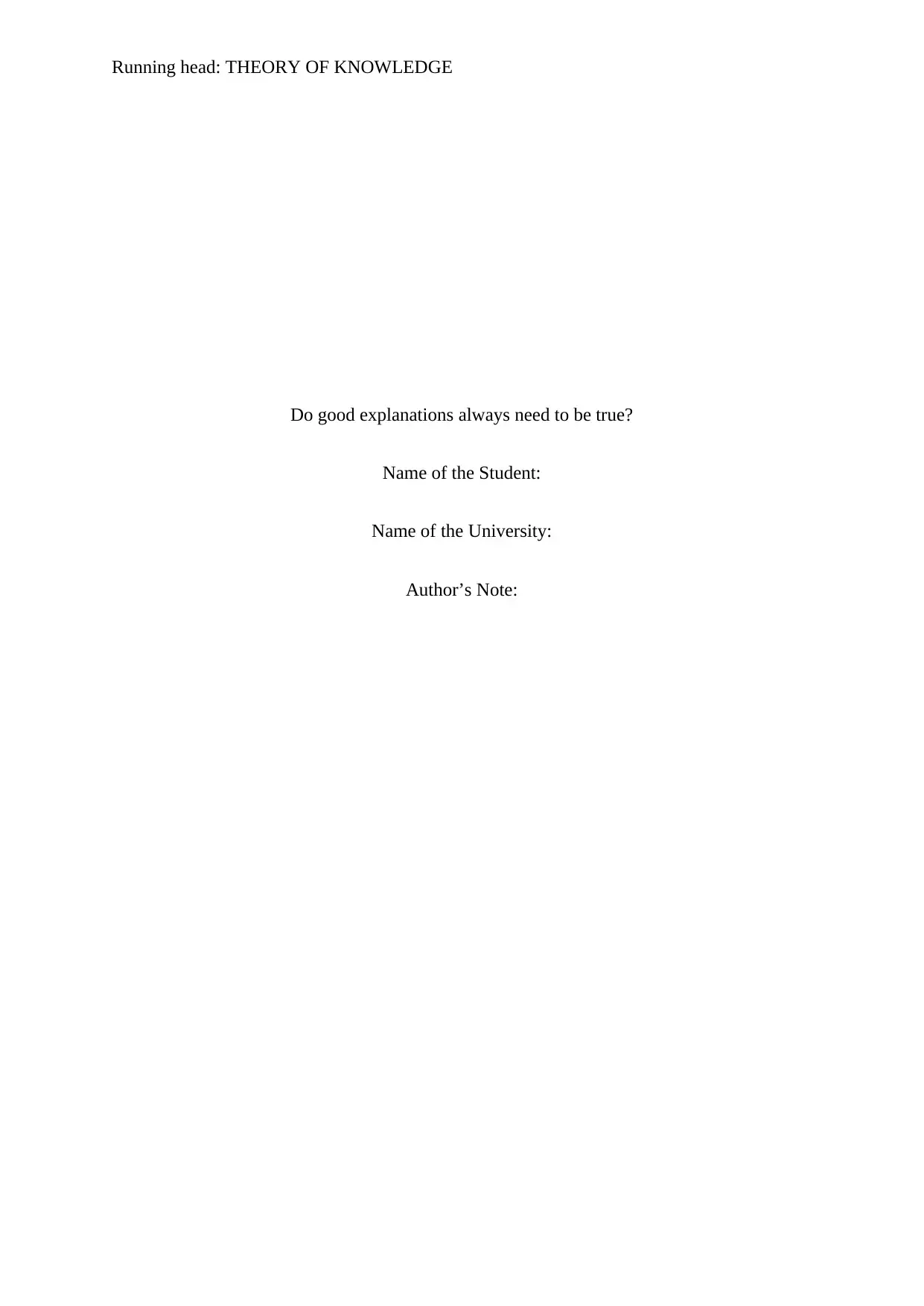
Running head: THEORY OF KNOWLEDGE
Do good explanations always need to be true?
Name of the Student:
Name of the University:
Author’s Note:
Do good explanations always need to be true?
Name of the Student:
Name of the University:
Author’s Note:
Paraphrase This Document
Need a fresh take? Get an instant paraphrase of this document with our AI Paraphraser
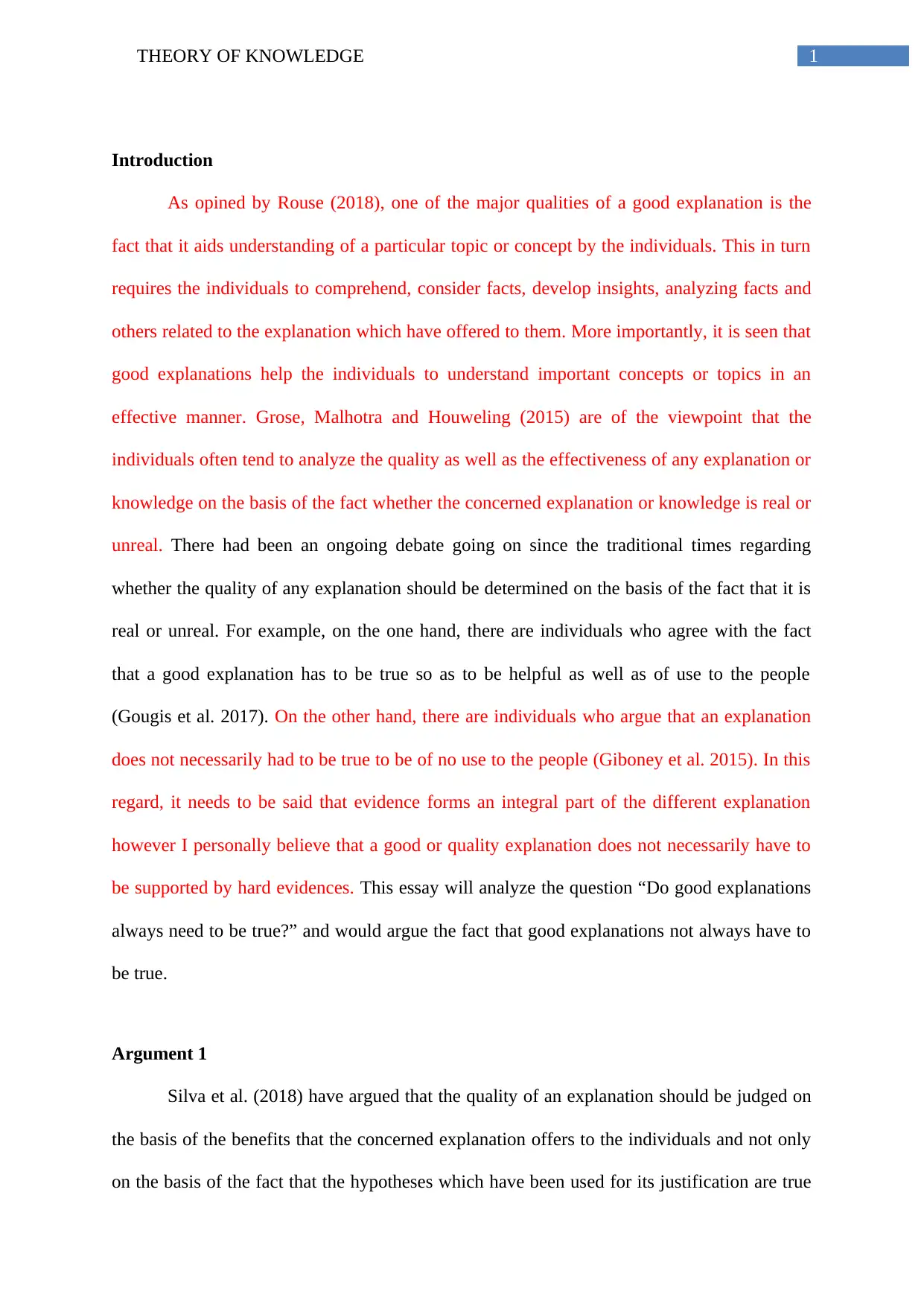
1THEORY OF KNOWLEDGE
Introduction
As opined by Rouse (2018), one of the major qualities of a good explanation is the
fact that it aids understanding of a particular topic or concept by the individuals. This in turn
requires the individuals to comprehend, consider facts, develop insights, analyzing facts and
others related to the explanation which have offered to them. More importantly, it is seen that
good explanations help the individuals to understand important concepts or topics in an
effective manner. Grose, Malhotra and Houweling (2015) are of the viewpoint that the
individuals often tend to analyze the quality as well as the effectiveness of any explanation or
knowledge on the basis of the fact whether the concerned explanation or knowledge is real or
unreal. There had been an ongoing debate going on since the traditional times regarding
whether the quality of any explanation should be determined on the basis of the fact that it is
real or unreal. For example, on the one hand, there are individuals who agree with the fact
that a good explanation has to be true so as to be helpful as well as of use to the people
(Gougis et al. 2017). On the other hand, there are individuals who argue that an explanation
does not necessarily had to be true to be of no use to the people (Giboney et al. 2015). In this
regard, it needs to be said that evidence forms an integral part of the different explanation
however I personally believe that a good or quality explanation does not necessarily have to
be supported by hard evidences. This essay will analyze the question “Do good explanations
always need to be true?” and would argue the fact that good explanations not always have to
be true.
Argument 1
Silva et al. (2018) have argued that the quality of an explanation should be judged on
the basis of the benefits that the concerned explanation offers to the individuals and not only
on the basis of the fact that the hypotheses which have been used for its justification are true
Introduction
As opined by Rouse (2018), one of the major qualities of a good explanation is the
fact that it aids understanding of a particular topic or concept by the individuals. This in turn
requires the individuals to comprehend, consider facts, develop insights, analyzing facts and
others related to the explanation which have offered to them. More importantly, it is seen that
good explanations help the individuals to understand important concepts or topics in an
effective manner. Grose, Malhotra and Houweling (2015) are of the viewpoint that the
individuals often tend to analyze the quality as well as the effectiveness of any explanation or
knowledge on the basis of the fact whether the concerned explanation or knowledge is real or
unreal. There had been an ongoing debate going on since the traditional times regarding
whether the quality of any explanation should be determined on the basis of the fact that it is
real or unreal. For example, on the one hand, there are individuals who agree with the fact
that a good explanation has to be true so as to be helpful as well as of use to the people
(Gougis et al. 2017). On the other hand, there are individuals who argue that an explanation
does not necessarily had to be true to be of no use to the people (Giboney et al. 2015). In this
regard, it needs to be said that evidence forms an integral part of the different explanation
however I personally believe that a good or quality explanation does not necessarily have to
be supported by hard evidences. This essay will analyze the question “Do good explanations
always need to be true?” and would argue the fact that good explanations not always have to
be true.
Argument 1
Silva et al. (2018) have argued that the quality of an explanation should be judged on
the basis of the benefits that the concerned explanation offers to the individuals and not only
on the basis of the fact that the hypotheses which have been used for its justification are true
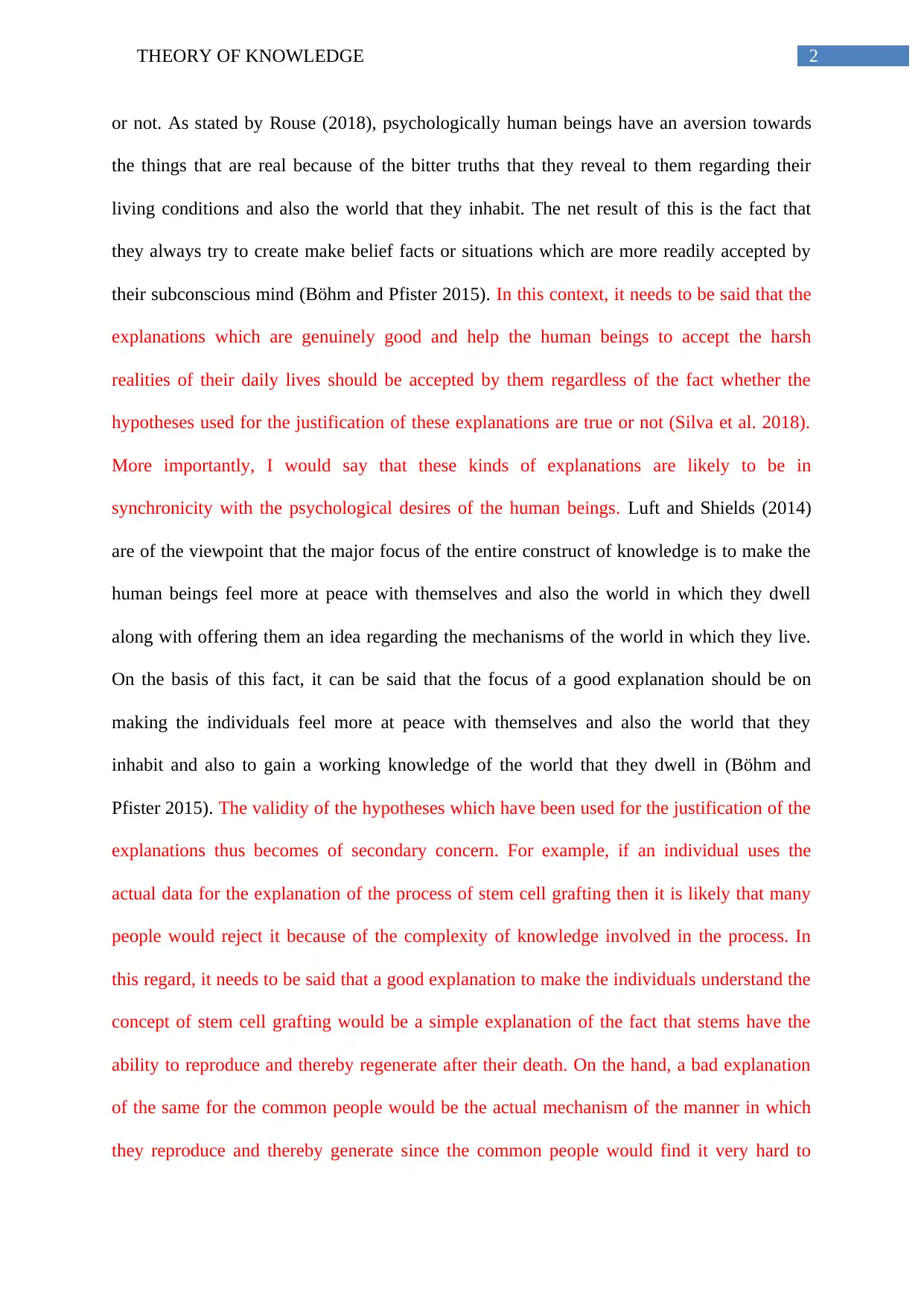
2THEORY OF KNOWLEDGE
or not. As stated by Rouse (2018), psychologically human beings have an aversion towards
the things that are real because of the bitter truths that they reveal to them regarding their
living conditions and also the world that they inhabit. The net result of this is the fact that
they always try to create make belief facts or situations which are more readily accepted by
their subconscious mind (Böhm and Pfister 2015). In this context, it needs to be said that the
explanations which are genuinely good and help the human beings to accept the harsh
realities of their daily lives should be accepted by them regardless of the fact whether the
hypotheses used for the justification of these explanations are true or not (Silva et al. 2018).
More importantly, I would say that these kinds of explanations are likely to be in
synchronicity with the psychological desires of the human beings. Luft and Shields (2014)
are of the viewpoint that the major focus of the entire construct of knowledge is to make the
human beings feel more at peace with themselves and also the world in which they dwell
along with offering them an idea regarding the mechanisms of the world in which they live.
On the basis of this fact, it can be said that the focus of a good explanation should be on
making the individuals feel more at peace with themselves and also the world that they
inhabit and also to gain a working knowledge of the world that they dwell in (Böhm and
Pfister 2015). The validity of the hypotheses which have been used for the justification of the
explanations thus becomes of secondary concern. For example, if an individual uses the
actual data for the explanation of the process of stem cell grafting then it is likely that many
people would reject it because of the complexity of knowledge involved in the process. In
this regard, it needs to be said that a good explanation to make the individuals understand the
concept of stem cell grafting would be a simple explanation of the fact that stems have the
ability to reproduce and thereby regenerate after their death. On the hand, a bad explanation
of the same for the common people would be the actual mechanism of the manner in which
they reproduce and thereby generate since the common people would find it very hard to
or not. As stated by Rouse (2018), psychologically human beings have an aversion towards
the things that are real because of the bitter truths that they reveal to them regarding their
living conditions and also the world that they inhabit. The net result of this is the fact that
they always try to create make belief facts or situations which are more readily accepted by
their subconscious mind (Böhm and Pfister 2015). In this context, it needs to be said that the
explanations which are genuinely good and help the human beings to accept the harsh
realities of their daily lives should be accepted by them regardless of the fact whether the
hypotheses used for the justification of these explanations are true or not (Silva et al. 2018).
More importantly, I would say that these kinds of explanations are likely to be in
synchronicity with the psychological desires of the human beings. Luft and Shields (2014)
are of the viewpoint that the major focus of the entire construct of knowledge is to make the
human beings feel more at peace with themselves and also the world in which they dwell
along with offering them an idea regarding the mechanisms of the world in which they live.
On the basis of this fact, it can be said that the focus of a good explanation should be on
making the individuals feel more at peace with themselves and also the world that they
inhabit and also to gain a working knowledge of the world that they dwell in (Böhm and
Pfister 2015). The validity of the hypotheses which have been used for the justification of the
explanations thus becomes of secondary concern. For example, if an individual uses the
actual data for the explanation of the process of stem cell grafting then it is likely that many
people would reject it because of the complexity of knowledge involved in the process. In
this regard, it needs to be said that a good explanation to make the individuals understand the
concept of stem cell grafting would be a simple explanation of the fact that stems have the
ability to reproduce and thereby regenerate after their death. On the hand, a bad explanation
of the same for the common people would be the actual mechanism of the manner in which
they reproduce and thereby generate since the common people would find it very hard to
⊘ This is a preview!⊘
Do you want full access?
Subscribe today to unlock all pages.

Trusted by 1+ million students worldwide
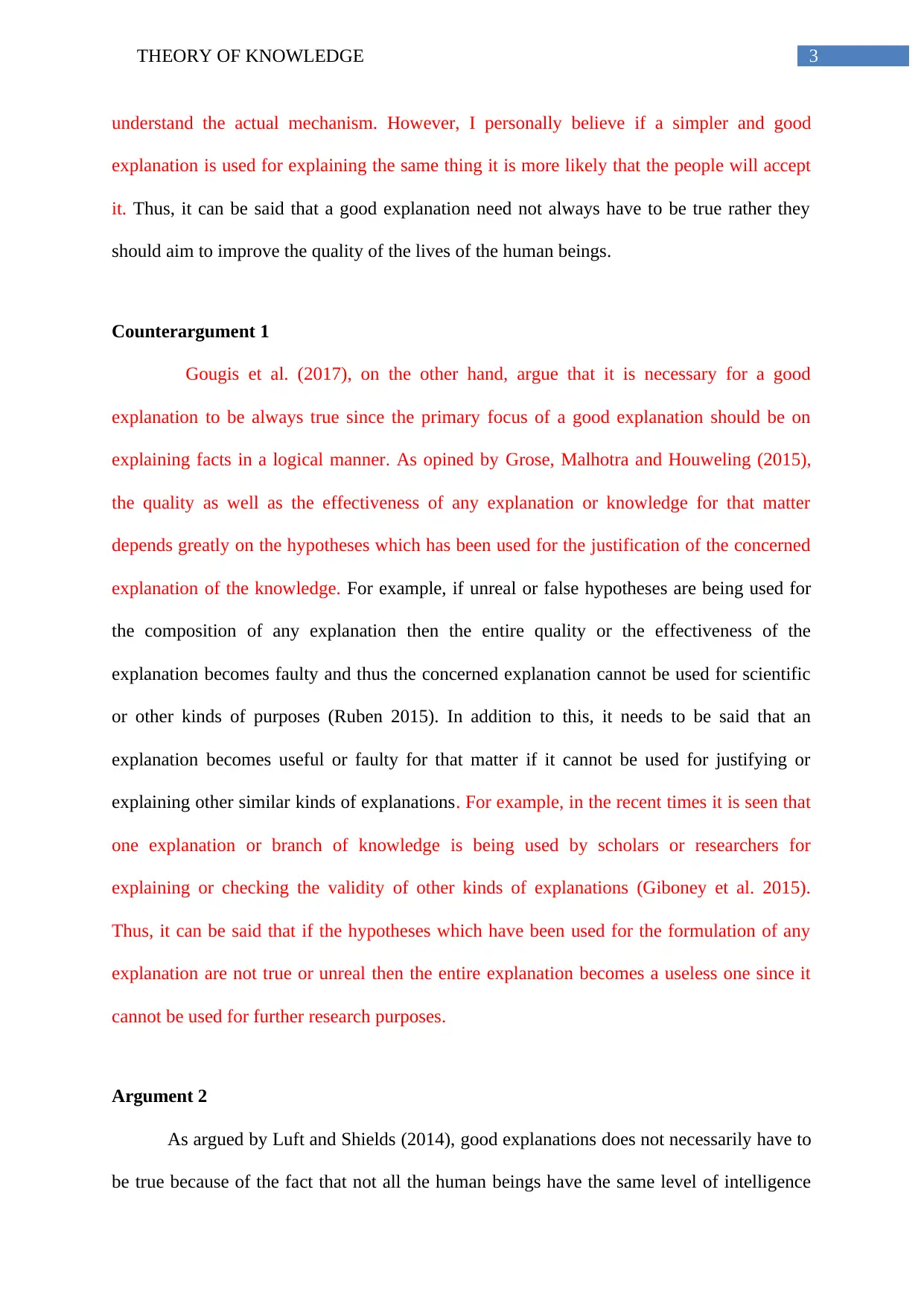
3THEORY OF KNOWLEDGE
understand the actual mechanism. However, I personally believe if a simpler and good
explanation is used for explaining the same thing it is more likely that the people will accept
it. Thus, it can be said that a good explanation need not always have to be true rather they
should aim to improve the quality of the lives of the human beings.
Counterargument 1
Gougis et al. (2017), on the other hand, argue that it is necessary for a good
explanation to be always true since the primary focus of a good explanation should be on
explaining facts in a logical manner. As opined by Grose, Malhotra and Houweling (2015),
the quality as well as the effectiveness of any explanation or knowledge for that matter
depends greatly on the hypotheses which has been used for the justification of the concerned
explanation of the knowledge. For example, if unreal or false hypotheses are being used for
the composition of any explanation then the entire quality or the effectiveness of the
explanation becomes faulty and thus the concerned explanation cannot be used for scientific
or other kinds of purposes (Ruben 2015). In addition to this, it needs to be said that an
explanation becomes useful or faulty for that matter if it cannot be used for justifying or
explaining other similar kinds of explanations. For example, in the recent times it is seen that
one explanation or branch of knowledge is being used by scholars or researchers for
explaining or checking the validity of other kinds of explanations (Giboney et al. 2015).
Thus, it can be said that if the hypotheses which have been used for the formulation of any
explanation are not true or unreal then the entire explanation becomes a useless one since it
cannot be used for further research purposes.
Argument 2
As argued by Luft and Shields (2014), good explanations does not necessarily have to
be true because of the fact that not all the human beings have the same level of intelligence
understand the actual mechanism. However, I personally believe if a simpler and good
explanation is used for explaining the same thing it is more likely that the people will accept
it. Thus, it can be said that a good explanation need not always have to be true rather they
should aim to improve the quality of the lives of the human beings.
Counterargument 1
Gougis et al. (2017), on the other hand, argue that it is necessary for a good
explanation to be always true since the primary focus of a good explanation should be on
explaining facts in a logical manner. As opined by Grose, Malhotra and Houweling (2015),
the quality as well as the effectiveness of any explanation or knowledge for that matter
depends greatly on the hypotheses which has been used for the justification of the concerned
explanation of the knowledge. For example, if unreal or false hypotheses are being used for
the composition of any explanation then the entire quality or the effectiveness of the
explanation becomes faulty and thus the concerned explanation cannot be used for scientific
or other kinds of purposes (Ruben 2015). In addition to this, it needs to be said that an
explanation becomes useful or faulty for that matter if it cannot be used for justifying or
explaining other similar kinds of explanations. For example, in the recent times it is seen that
one explanation or branch of knowledge is being used by scholars or researchers for
explaining or checking the validity of other kinds of explanations (Giboney et al. 2015).
Thus, it can be said that if the hypotheses which have been used for the formulation of any
explanation are not true or unreal then the entire explanation becomes a useless one since it
cannot be used for further research purposes.
Argument 2
As argued by Luft and Shields (2014), good explanations does not necessarily have to
be true because of the fact that not all the human beings have the same level of intelligence
Paraphrase This Document
Need a fresh take? Get an instant paraphrase of this document with our AI Paraphraser
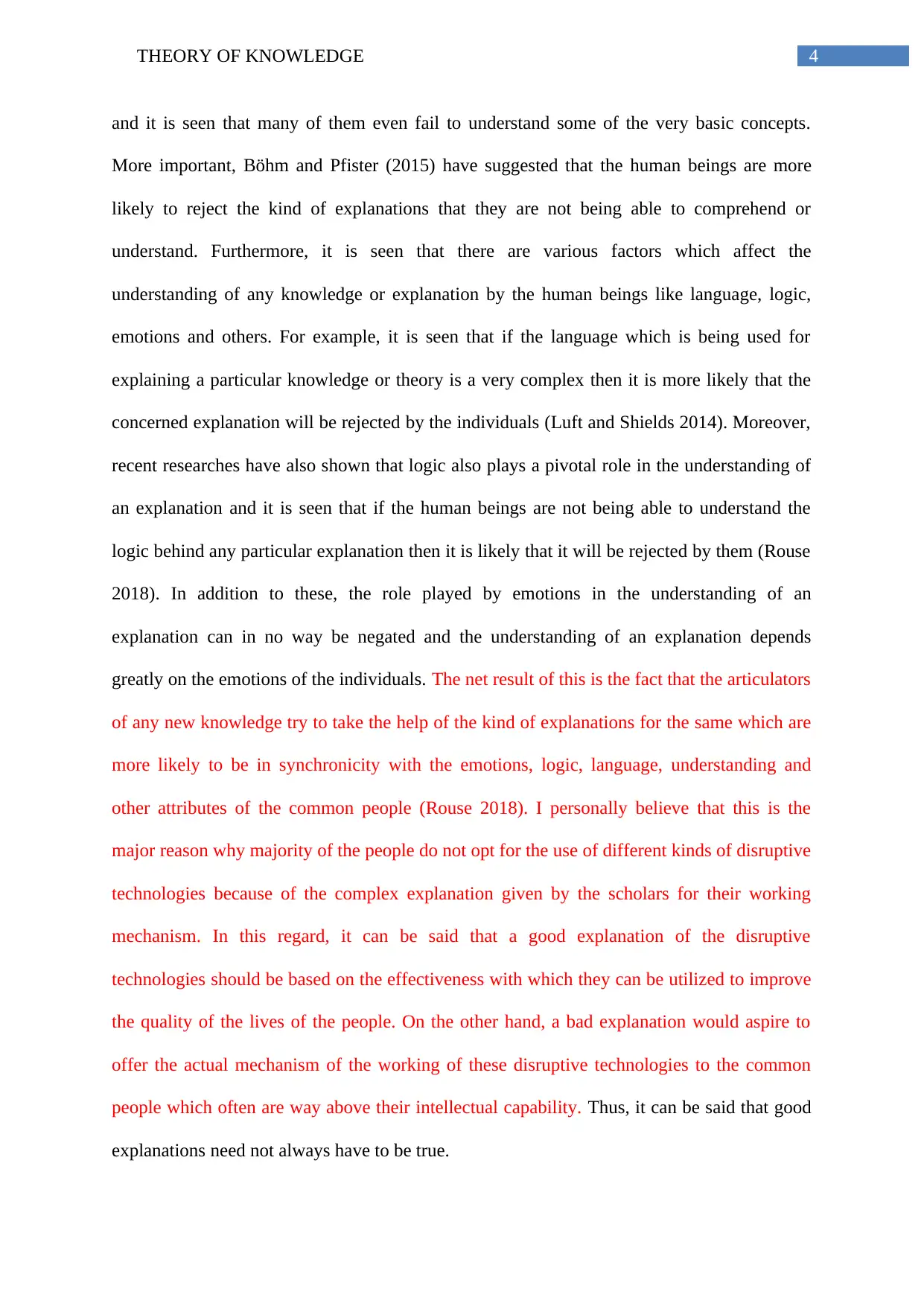
4THEORY OF KNOWLEDGE
and it is seen that many of them even fail to understand some of the very basic concepts.
More important, Böhm and Pfister (2015) have suggested that the human beings are more
likely to reject the kind of explanations that they are not being able to comprehend or
understand. Furthermore, it is seen that there are various factors which affect the
understanding of any knowledge or explanation by the human beings like language, logic,
emotions and others. For example, it is seen that if the language which is being used for
explaining a particular knowledge or theory is a very complex then it is more likely that the
concerned explanation will be rejected by the individuals (Luft and Shields 2014). Moreover,
recent researches have also shown that logic also plays a pivotal role in the understanding of
an explanation and it is seen that if the human beings are not being able to understand the
logic behind any particular explanation then it is likely that it will be rejected by them (Rouse
2018). In addition to these, the role played by emotions in the understanding of an
explanation can in no way be negated and the understanding of an explanation depends
greatly on the emotions of the individuals. The net result of this is the fact that the articulators
of any new knowledge try to take the help of the kind of explanations for the same which are
more likely to be in synchronicity with the emotions, logic, language, understanding and
other attributes of the common people (Rouse 2018). I personally believe that this is the
major reason why majority of the people do not opt for the use of different kinds of disruptive
technologies because of the complex explanation given by the scholars for their working
mechanism. In this regard, it can be said that a good explanation of the disruptive
technologies should be based on the effectiveness with which they can be utilized to improve
the quality of the lives of the people. On the other hand, a bad explanation would aspire to
offer the actual mechanism of the working of these disruptive technologies to the common
people which often are way above their intellectual capability. Thus, it can be said that good
explanations need not always have to be true.
and it is seen that many of them even fail to understand some of the very basic concepts.
More important, Böhm and Pfister (2015) have suggested that the human beings are more
likely to reject the kind of explanations that they are not being able to comprehend or
understand. Furthermore, it is seen that there are various factors which affect the
understanding of any knowledge or explanation by the human beings like language, logic,
emotions and others. For example, it is seen that if the language which is being used for
explaining a particular knowledge or theory is a very complex then it is more likely that the
concerned explanation will be rejected by the individuals (Luft and Shields 2014). Moreover,
recent researches have also shown that logic also plays a pivotal role in the understanding of
an explanation and it is seen that if the human beings are not being able to understand the
logic behind any particular explanation then it is likely that it will be rejected by them (Rouse
2018). In addition to these, the role played by emotions in the understanding of an
explanation can in no way be negated and the understanding of an explanation depends
greatly on the emotions of the individuals. The net result of this is the fact that the articulators
of any new knowledge try to take the help of the kind of explanations for the same which are
more likely to be in synchronicity with the emotions, logic, language, understanding and
other attributes of the common people (Rouse 2018). I personally believe that this is the
major reason why majority of the people do not opt for the use of different kinds of disruptive
technologies because of the complex explanation given by the scholars for their working
mechanism. In this regard, it can be said that a good explanation of the disruptive
technologies should be based on the effectiveness with which they can be utilized to improve
the quality of the lives of the people. On the other hand, a bad explanation would aspire to
offer the actual mechanism of the working of these disruptive technologies to the common
people which often are way above their intellectual capability. Thus, it can be said that good
explanations need not always have to be true.
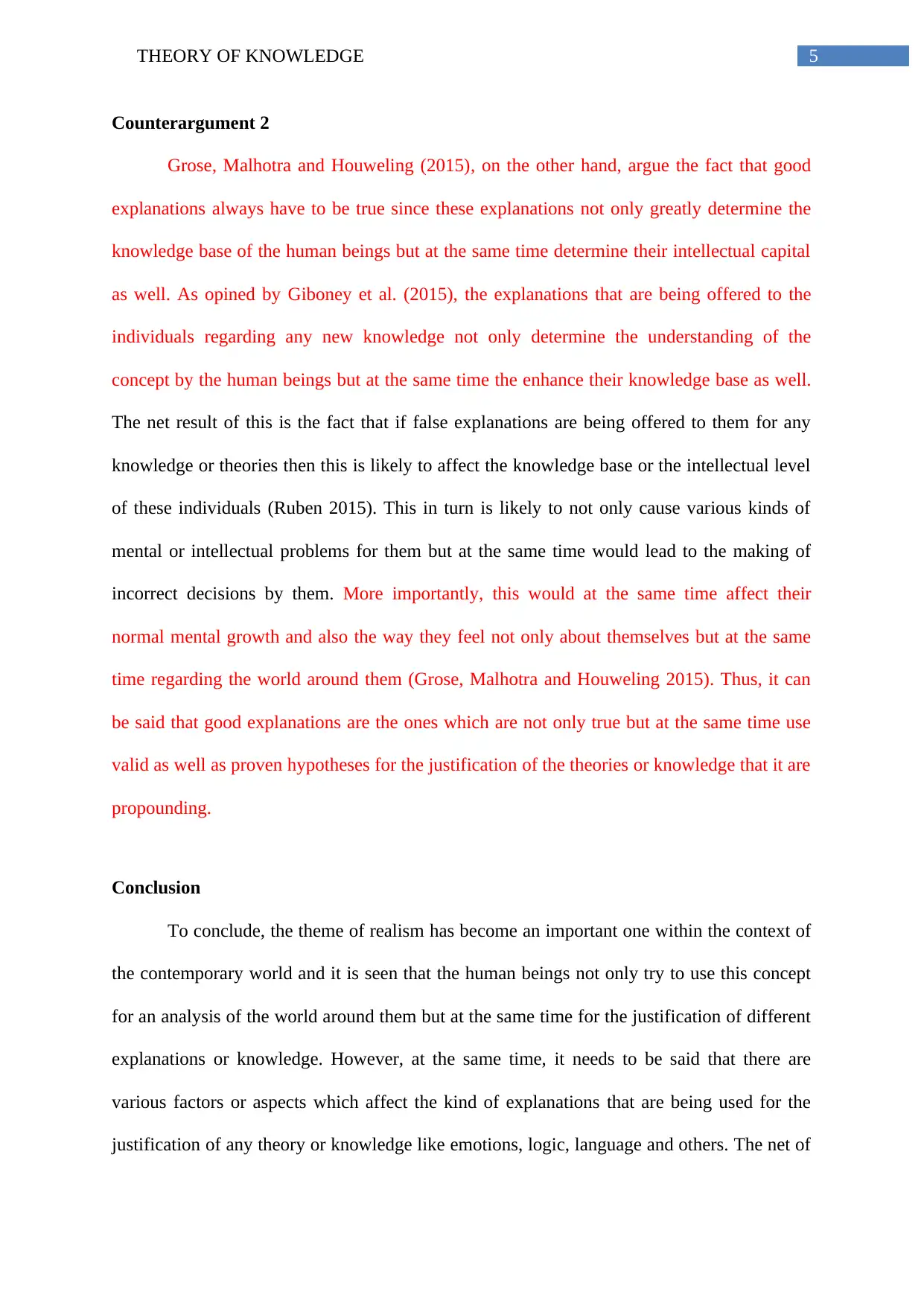
5THEORY OF KNOWLEDGE
Counterargument 2
Grose, Malhotra and Houweling (2015), on the other hand, argue the fact that good
explanations always have to be true since these explanations not only greatly determine the
knowledge base of the human beings but at the same time determine their intellectual capital
as well. As opined by Giboney et al. (2015), the explanations that are being offered to the
individuals regarding any new knowledge not only determine the understanding of the
concept by the human beings but at the same time the enhance their knowledge base as well.
The net result of this is the fact that if false explanations are being offered to them for any
knowledge or theories then this is likely to affect the knowledge base or the intellectual level
of these individuals (Ruben 2015). This in turn is likely to not only cause various kinds of
mental or intellectual problems for them but at the same time would lead to the making of
incorrect decisions by them. More importantly, this would at the same time affect their
normal mental growth and also the way they feel not only about themselves but at the same
time regarding the world around them (Grose, Malhotra and Houweling 2015). Thus, it can
be said that good explanations are the ones which are not only true but at the same time use
valid as well as proven hypotheses for the justification of the theories or knowledge that it are
propounding.
Conclusion
To conclude, the theme of realism has become an important one within the context of
the contemporary world and it is seen that the human beings not only try to use this concept
for an analysis of the world around them but at the same time for the justification of different
explanations or knowledge. However, at the same time, it needs to be said that there are
various factors or aspects which affect the kind of explanations that are being used for the
justification of any theory or knowledge like emotions, logic, language and others. The net of
Counterargument 2
Grose, Malhotra and Houweling (2015), on the other hand, argue the fact that good
explanations always have to be true since these explanations not only greatly determine the
knowledge base of the human beings but at the same time determine their intellectual capital
as well. As opined by Giboney et al. (2015), the explanations that are being offered to the
individuals regarding any new knowledge not only determine the understanding of the
concept by the human beings but at the same time the enhance their knowledge base as well.
The net result of this is the fact that if false explanations are being offered to them for any
knowledge or theories then this is likely to affect the knowledge base or the intellectual level
of these individuals (Ruben 2015). This in turn is likely to not only cause various kinds of
mental or intellectual problems for them but at the same time would lead to the making of
incorrect decisions by them. More importantly, this would at the same time affect their
normal mental growth and also the way they feel not only about themselves but at the same
time regarding the world around them (Grose, Malhotra and Houweling 2015). Thus, it can
be said that good explanations are the ones which are not only true but at the same time use
valid as well as proven hypotheses for the justification of the theories or knowledge that it are
propounding.
Conclusion
To conclude, the theme of realism has become an important one within the context of
the contemporary world and it is seen that the human beings not only try to use this concept
for an analysis of the world around them but at the same time for the justification of different
explanations or knowledge. However, at the same time, it needs to be said that there are
various factors or aspects which affect the kind of explanations that are being used for the
justification of any theory or knowledge like emotions, logic, language and others. The net of
⊘ This is a preview!⊘
Do you want full access?
Subscribe today to unlock all pages.

Trusted by 1+ million students worldwide
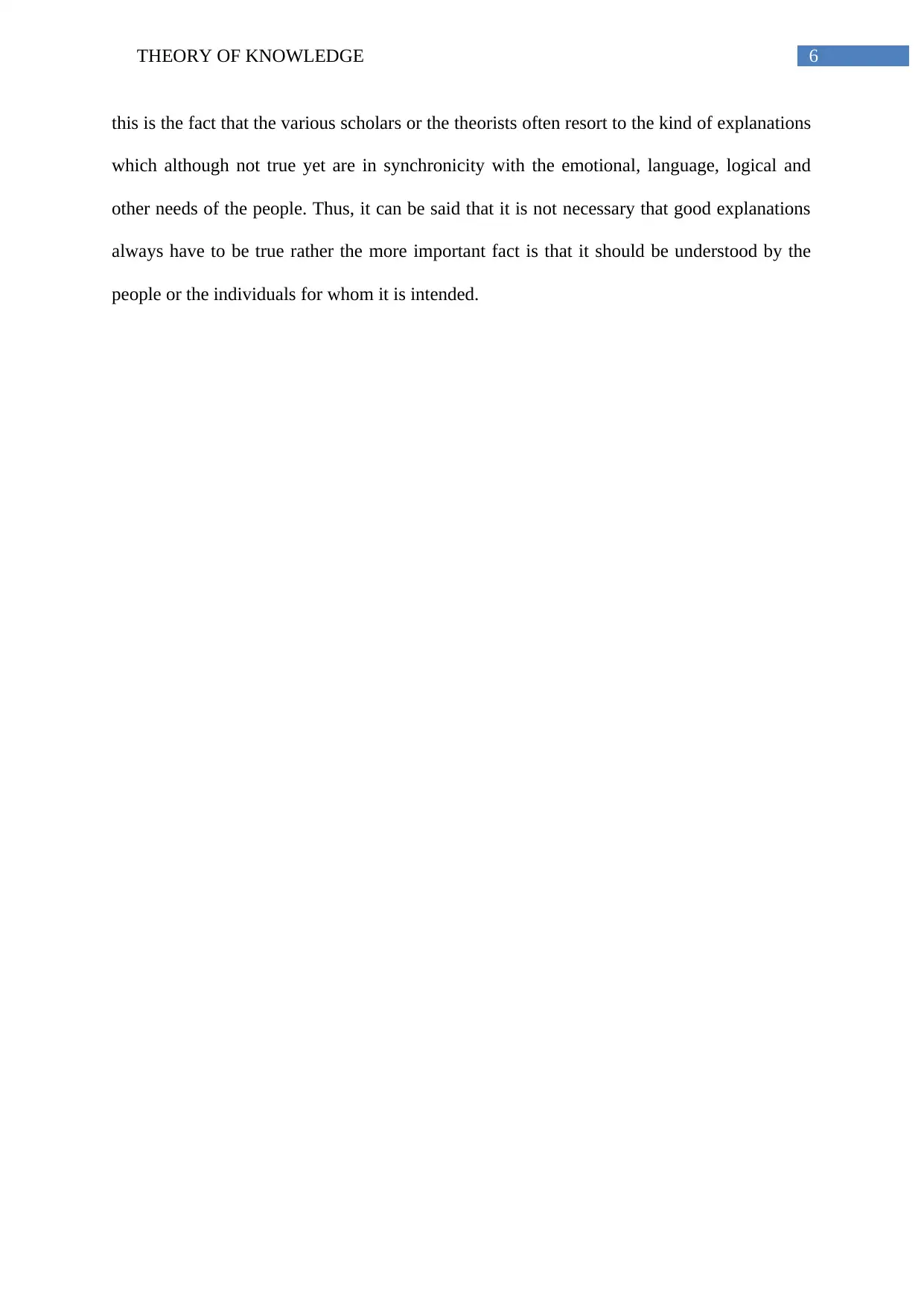
6THEORY OF KNOWLEDGE
this is the fact that the various scholars or the theorists often resort to the kind of explanations
which although not true yet are in synchronicity with the emotional, language, logical and
other needs of the people. Thus, it can be said that it is not necessary that good explanations
always have to be true rather the more important fact is that it should be understood by the
people or the individuals for whom it is intended.
this is the fact that the various scholars or the theorists often resort to the kind of explanations
which although not true yet are in synchronicity with the emotional, language, logical and
other needs of the people. Thus, it can be said that it is not necessary that good explanations
always have to be true rather the more important fact is that it should be understood by the
people or the individuals for whom it is intended.
Paraphrase This Document
Need a fresh take? Get an instant paraphrase of this document with our AI Paraphraser
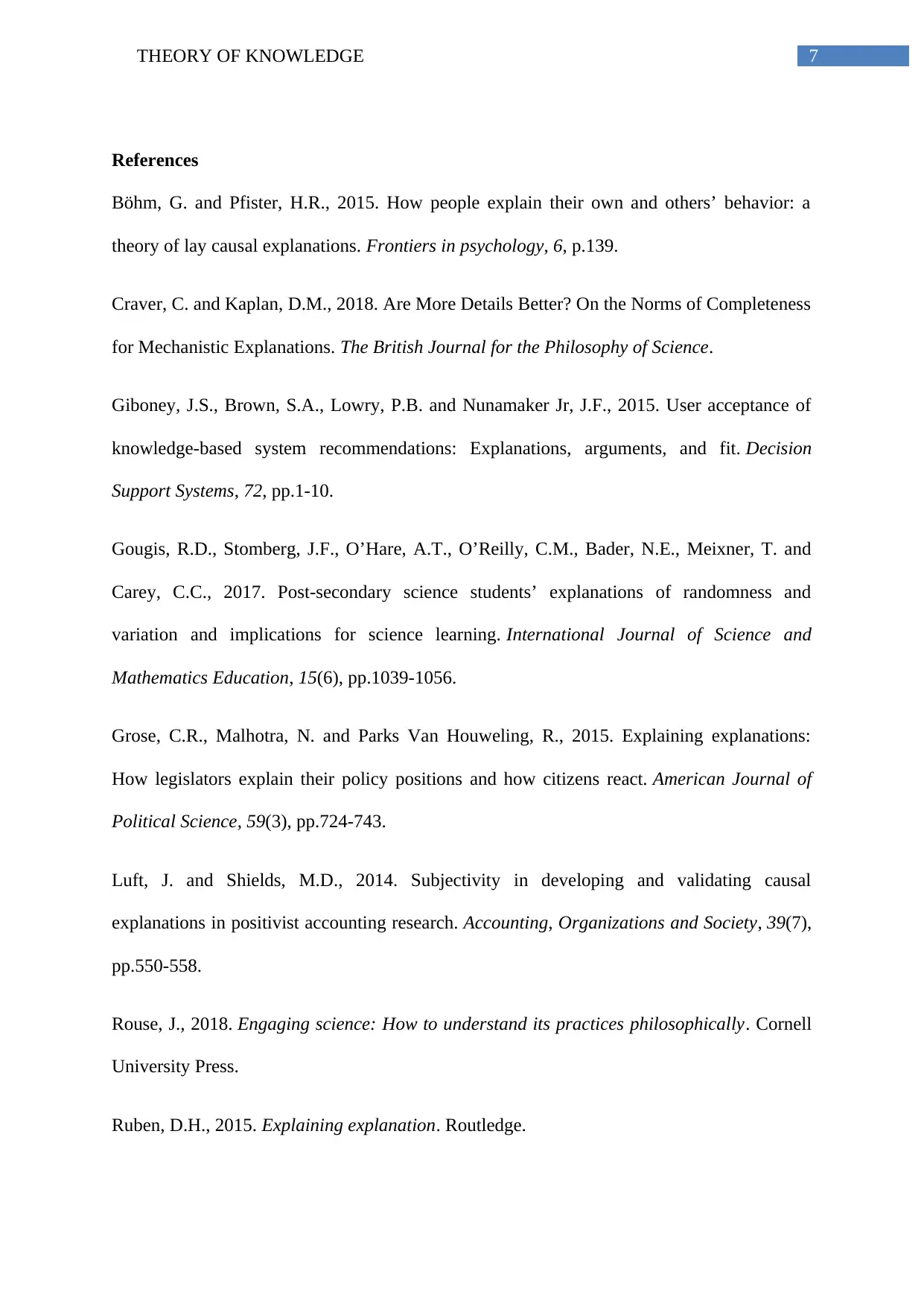
7THEORY OF KNOWLEDGE
References
Böhm, G. and Pfister, H.R., 2015. How people explain their own and others’ behavior: a
theory of lay causal explanations. Frontiers in psychology, 6, p.139.
Craver, C. and Kaplan, D.M., 2018. Are More Details Better? On the Norms of Completeness
for Mechanistic Explanations. The British Journal for the Philosophy of Science.
Giboney, J.S., Brown, S.A., Lowry, P.B. and Nunamaker Jr, J.F., 2015. User acceptance of
knowledge-based system recommendations: Explanations, arguments, and fit. Decision
Support Systems, 72, pp.1-10.
Gougis, R.D., Stomberg, J.F., O’Hare, A.T., O’Reilly, C.M., Bader, N.E., Meixner, T. and
Carey, C.C., 2017. Post-secondary science students’ explanations of randomness and
variation and implications for science learning. International Journal of Science and
Mathematics Education, 15(6), pp.1039-1056.
Grose, C.R., Malhotra, N. and Parks Van Houweling, R., 2015. Explaining explanations:
How legislators explain their policy positions and how citizens react. American Journal of
Political Science, 59(3), pp.724-743.
Luft, J. and Shields, M.D., 2014. Subjectivity in developing and validating causal
explanations in positivist accounting research. Accounting, Organizations and Society, 39(7),
pp.550-558.
Rouse, J., 2018. Engaging science: How to understand its practices philosophically. Cornell
University Press.
Ruben, D.H., 2015. Explaining explanation. Routledge.
References
Böhm, G. and Pfister, H.R., 2015. How people explain their own and others’ behavior: a
theory of lay causal explanations. Frontiers in psychology, 6, p.139.
Craver, C. and Kaplan, D.M., 2018. Are More Details Better? On the Norms of Completeness
for Mechanistic Explanations. The British Journal for the Philosophy of Science.
Giboney, J.S., Brown, S.A., Lowry, P.B. and Nunamaker Jr, J.F., 2015. User acceptance of
knowledge-based system recommendations: Explanations, arguments, and fit. Decision
Support Systems, 72, pp.1-10.
Gougis, R.D., Stomberg, J.F., O’Hare, A.T., O’Reilly, C.M., Bader, N.E., Meixner, T. and
Carey, C.C., 2017. Post-secondary science students’ explanations of randomness and
variation and implications for science learning. International Journal of Science and
Mathematics Education, 15(6), pp.1039-1056.
Grose, C.R., Malhotra, N. and Parks Van Houweling, R., 2015. Explaining explanations:
How legislators explain their policy positions and how citizens react. American Journal of
Political Science, 59(3), pp.724-743.
Luft, J. and Shields, M.D., 2014. Subjectivity in developing and validating causal
explanations in positivist accounting research. Accounting, Organizations and Society, 39(7),
pp.550-558.
Rouse, J., 2018. Engaging science: How to understand its practices philosophically. Cornell
University Press.
Ruben, D.H., 2015. Explaining explanation. Routledge.
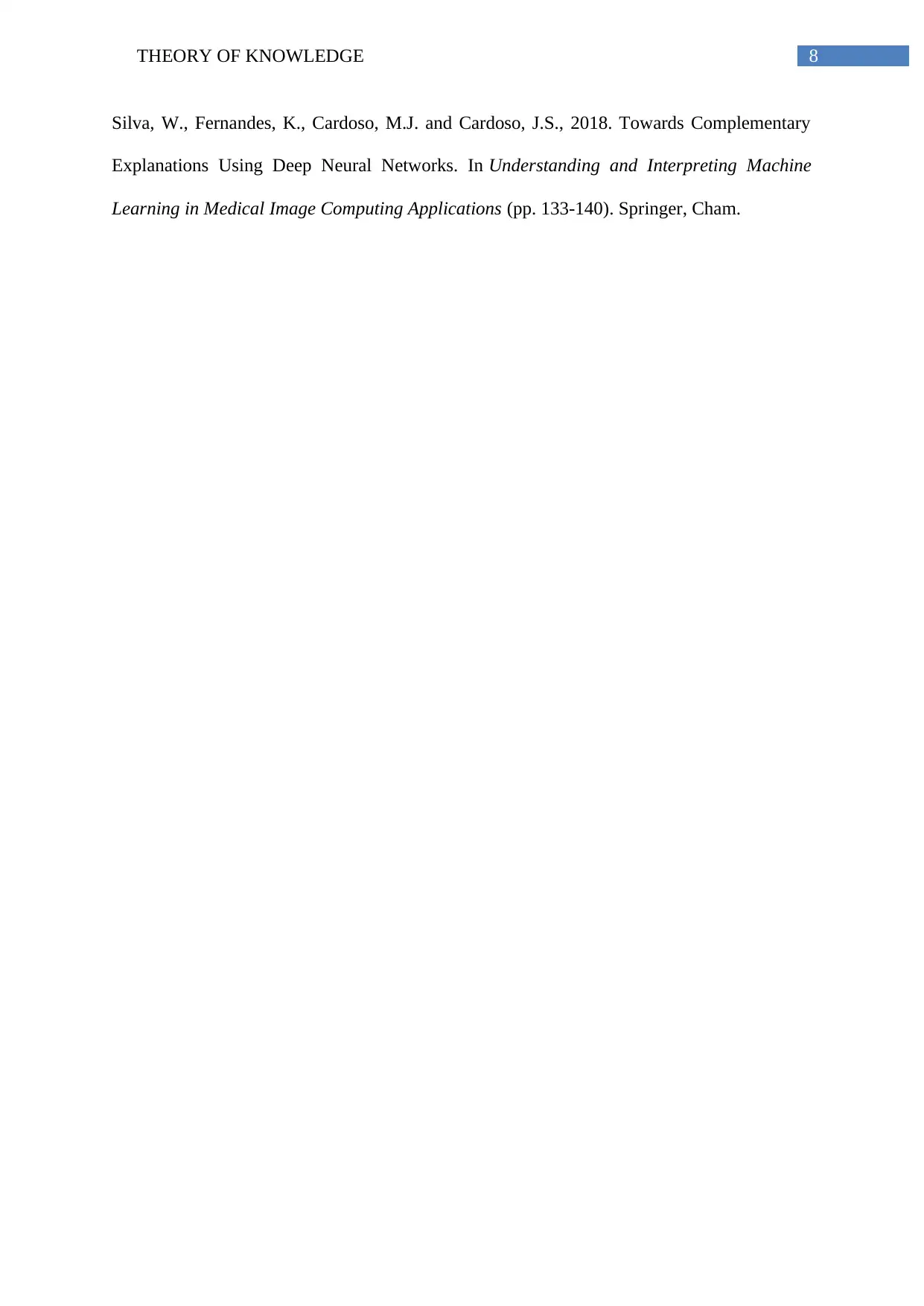
8THEORY OF KNOWLEDGE
Silva, W., Fernandes, K., Cardoso, M.J. and Cardoso, J.S., 2018. Towards Complementary
Explanations Using Deep Neural Networks. In Understanding and Interpreting Machine
Learning in Medical Image Computing Applications (pp. 133-140). Springer, Cham.
Silva, W., Fernandes, K., Cardoso, M.J. and Cardoso, J.S., 2018. Towards Complementary
Explanations Using Deep Neural Networks. In Understanding and Interpreting Machine
Learning in Medical Image Computing Applications (pp. 133-140). Springer, Cham.
⊘ This is a preview!⊘
Do you want full access?
Subscribe today to unlock all pages.

Trusted by 1+ million students worldwide
1 out of 9
Related Documents
Your All-in-One AI-Powered Toolkit for Academic Success.
+13062052269
info@desklib.com
Available 24*7 on WhatsApp / Email
![[object Object]](/_next/static/media/star-bottom.7253800d.svg)
Unlock your academic potential
Copyright © 2020–2026 A2Z Services. All Rights Reserved. Developed and managed by ZUCOL.




